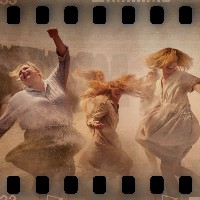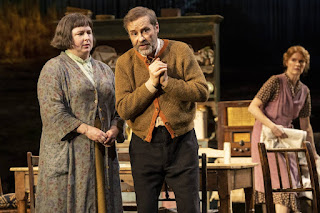The sisters have recently also been joined by their brother Jack (Ardal O'Hanlon,) a priest who spent twenty years at a leper colony in Uganda, and has returned home now as he's dying of malaria, and his mind has started to go.
The action takes place over the course of the old harvest festival of Lughnasa, although Kate doesn't like them to even mention that because of its pagan origins. That's nothing, though, compared to what comes out when Jack starts rambling about his time in Africa, and it appears the real reason he's been sent home is that rather than convert the locals to Christianity, he's in fact been enthusiastically embracing the local traditions and beliefs.
There's a lot that's good about Dancing at Lughnasa, not least of all in the performances: There's a deep-seated sadness at the core of the play, but like the dances the sisters occasionally break into to relive a lost, hopeful youth, it's broken up by humour and optimism despite everything starting to crumble, both for the family and the way of life around them. When she's visited by Michael's rakish, habitual bullshitter father Gerry (Tom Riley,) Chris seems to come back to life and there's a genuine sweetness to their scenes, but we know this only prefaces her next bout of depression when he disappears again.
McSweeney is the standout in a strong cast as the fun aunt whose underlying melancholy at being part of a house full of spinsters shows through, and is as great as anyone's. Her reactions as she spies on Chris and Gerry's reunion through the invisible walls are a scene-stealing highlight, and she makes a low-key running gag out of Maggie's fondness for terrible riddles.
But if the story is viewed through a fog of memory, that fog's as thick as treacle - at nearly three hours long, those hours feel even longer as we slowly trudge through the women's thankless lives. And every time Vaughan-Lawlor looms onto the set, Michael's wistful monologues just make what's already slow grind to a halt. And while I can see why the final scene is interrupted for an extended preview of how life works out for the characters - it's to cast a shadow over the closing moments - the execution feels clumsy, as if Michael's chosen an entirely arbitrary moment to wrap up the story. I found a lot to appreciate in Dancing at Lughnasa, but I found the overall package it's wrapped up in a slog.
Dancing at Lughnasa by Brian Friel is booking until the 27th of May at the National Theatre's Olivier.
Running time: 2 hours 45 minutes including interval.
Photo credit: Johan Persson.





No comments:
Post a Comment